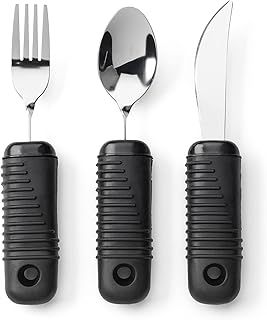
Eating
As seniors age, they may experience changes in physical abilities that can make everyday tasks more challenging. One area where seniors may struggle is during mealtime. For seniors with arthritis or limited dexterity, something as simple as eating can become difficult. However, there are adaptive utensils and tools available that can help make eating easier and more enjoyable for seniors.
 One common issue for seniors is gripping small utensils, such as forks and knives, due to arthritis or limited hand strength. Adaptive utensils with larger grips or built-up handles can provide the extra support needed to grasp and maneuver utensils more easily. Some examples of adaptive utensils that could benefit seniors include:
One common issue for seniors is gripping small utensils, such as forks and knives, due to arthritis or limited hand strength. Adaptive utensils with larger grips or built-up handles can provide the extra support needed to grasp and maneuver utensils more easily. Some examples of adaptive utensils that could benefit seniors include:
1. Weighted utensils - These utensils have additional weight in the handle, which can help stabilize hand tremors and make it easier to lift food to the mouth.
2. Angled utensils - Angled utensils can reduce the need for seniors to twist their wrists excessively while eating, making it more comfortable for those with limited flexibility.
3. Non-slip grips - Utensils with non-slip grips can help seniors maintain a secure hold on the utensil, reducing the risk of dropping it during meals.
4. Adaptive plates and bowls - In addition to utensils, adaptive plates and bowls with suction cups or non-slip bases can make it easier for seniors to scoop up food without the plate sliding around.
5. One-handed utensils - For seniors with limited dexterity in one hand, one-handed utensils can help make eating with just one hand easier and more manageable.
6. Spill-proof cups - Seniors with shaky hands or mobility issues may benefit from spill-proof cups with lids and built-in straws to prevent spills and make drinking easier.
These adaptive utensils and tools can greatly benefit seniors by allowing them to maintain their independence and enjoy meals without struggling. Many of these items can be purchased at medical supply stores, online retailers, or through occupational therapists. It is important for seniors and their caregivers to explore these options and find the right adaptive utensils that work best for their individual needs.
In conclusion, adaptive utensils and tools can greatly improve the dining experience for seniors with arthritis or limited dexterity. By investing in these items, seniors can continue to enjoy meals independently and comfortably, improving their overall quality of life.
Five Adaptive Eating Tools for Seniors
1. Good Grips Weighted Utensils
- Description: These utensils have a weighted design that helps stabilize hand tremors and make eating easier for seniors with arthritis or limited dexterity.
- Functionality: The increased weight provides added stability and decreases the effort needed to hold the utensils steady while eating.
2. Adaptive Bendable Spoon and Fork Set
- Description: This set includes a bendable spoon and fork that can be easily shaped to accommodate the hand movements of seniors with arthritis or limited dexterity.
- Functionality: The bendable feature allows for customization to fit the user's specific needs and makes it easier for seniors to bring food to their mouth without straining.
3. Rocker Knife
- Description: A rocker knife is designed with a curved blade that allows for easy cutting of food without requiring a sawing motion, making it ideal for seniors with arthritis or limited hand strength.
- Functionality: The rocking motion of the knife enables users to cut food by simply applying pressure downward, reducing the effort needed to perform cutting tasks.
4. Easy Grip Cups
- Description: Easy grip cups feature large, textured handles that are easy to grasp and hold securely, making them ideal for seniors with arthritis or limited hand strength.
- Functionality: The ergonomic design of the cups enhances stability and control, reducing the risk of spills and making it easier for seniors to drink without straining their hands or wrists.
5. Adaptive Plate Guard
- Description: A plate guard is a device that attaches to a plate to create a barrier that helps prevent food from spilling or falling off the edges, making it easier for seniors with arthritis or limited dexterity to scoop food onto utensils.
- Functionality: The plate guard provides a raised lip around the plate to contain food and allows seniors to push food against the barrier for easier scooping and eating.
Additional tips:
- Encourage seniors to use utensils with larger handles for better grip and control.
- Consider using utensils with built-in stabilizing features, such as finger grips or non-slip materials.
- Provide support and encouragement when introducing new adaptive utensils to help seniors adapt to the changes in their eating routine.
As an Amazon Associate, I earn from qualifying purchases. Please note that some of the links to products presented might be affiliate links.The links may take you to Amazon.com, where you will also be able to find other similar products to best meet your needs. Specific products are not being recommended but shared. This should enable you to reduce any additional search time.